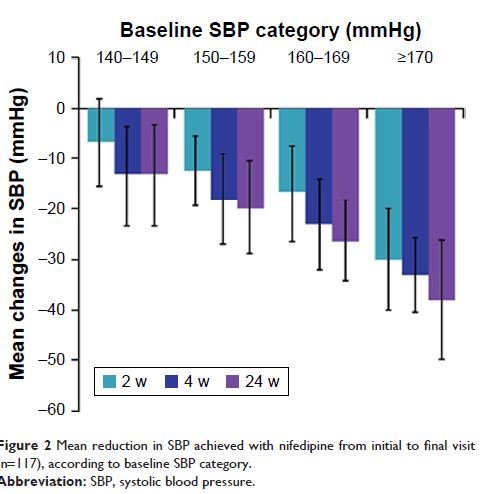108384
论文已发表
注册即可获取德孚的最新动态
IF 收录期刊
- 3.4 Breast Cancer (Dove Med Press)
- 3.2 Clin Epidemiol
- 2.6 Cancer Manag Res
- 2.9 Infect Drug Resist
- 3.7 Clin Interv Aging
- 5.1 Drug Des Dev Ther
- 3.1 Int J Chronic Obstr
- 6.6 Int J Nanomed
- 2.6 Int J Women's Health
- 2.9 Neuropsych Dis Treat
- 2.8 OncoTargets Ther
- 2.0 Patient Prefer Adher
- 2.2 Ther Clin Risk Manag
- 2.5 J Pain Res
- 3.0 Diabet Metab Synd Ob
- 3.2 Psychol Res Behav Ma
- 3.4 Nat Sci Sleep
- 1.8 Pharmgenomics Pers Med
- 2.0 Risk Manag Healthc Policy
- 4.1 J Inflamm Res
- 2.0 Int J Gen Med
- 3.4 J Hepatocell Carcinoma
- 3.0 J Asthma Allergy
- 2.2 Clin Cosmet Investig Dermatol
- 2.4 J Multidiscip Healthc

已发表论文
基础血压对于由硝苯地平 (Nifedipine) 胃肠治疗系统导致的血压降低的量值的影响:Wilder 原理
Authors Hu HJ, Zhang JD, Wang Y, Tian ZJ, Liu DM, Zhang GM, Gu GQ, Zheng HM, Xie RQ, Cui W
Received 8 June 2017
Accepted for publication 28 September 2017
Published 6 November 2017 Volume 2017:11 Pages 3179—3186
DOI https://doi.org/10.2147/DDDT.S143551
Checked for plagiarism Yes
Review by Single-blind
Peer reviewers approved by Dr Colin Mak
Peer reviewer comments 3
Editor who approved publication: Dr Sukesh Voruganti
Background: The objective of the
study was to investigate the relationship between baseline blood pressure (BP)
and the magnitude of BP reduction in patients with essential hypertension
treated with nifedipine gastrointestinal therapeutic system (NGTS).
Methods and patients: One hundred and thirty-eight patients with essential hypertension were enrolled in this prospective, single-arm, open-label study. NGTS was administered for 24 weeks to achieve target BP of 140/90 mmHg. The dose could be uptitrated to 60 mg/d in case of unsatisfactory BP reduction after 4-week treatment. Home blood pressure measurement was recorded through the initial 1–14 days, and office BP and heart rate were evaluated at 2, 4, 8, 12, and 24 weeks.
Results: One hundred and seventeen patients (84.8%) completed the study, and their average BP decreased by 19.0/11.3 mmHg after 24 weeks. The reduction of either systolic or diastolic BP was positively correlated with baseline BP at weeks 2, 4, or 24 after treatment (r =0.603–0.762, all p <0.05). The maximal BP reduction was observed in 83% of patients at 4 weeks of treatment even though the dose of nifedipine remained unchanged (30 mg/day).
Conclusion: These findings show that BP reduction is greatly influenced by the baseline level. Patients with high baseline BP had maximum reduction after treatment with NGTS, and the maximal antihypertensive efficacy of NGTS could appear even at 4 weeks after treatment initiation.
Keywords: baseline blood pressure, hypertension, nifedipine gastrointestinal therapeutic system
Methods and patients: One hundred and thirty-eight patients with essential hypertension were enrolled in this prospective, single-arm, open-label study. NGTS was administered for 24 weeks to achieve target BP of 140/90 mmHg. The dose could be uptitrated to 60 mg/d in case of unsatisfactory BP reduction after 4-week treatment. Home blood pressure measurement was recorded through the initial 1–14 days, and office BP and heart rate were evaluated at 2, 4, 8, 12, and 24 weeks.
Results: One hundred and seventeen patients (84.8%) completed the study, and their average BP decreased by 19.0/11.3 mmHg after 24 weeks. The reduction of either systolic or diastolic BP was positively correlated with baseline BP at weeks 2, 4, or 24 after treatment (r =0.603–0.762, all p <0.05). The maximal BP reduction was observed in 83% of patients at 4 weeks of treatment even though the dose of nifedipine remained unchanged (30 mg/day).
Conclusion: These findings show that BP reduction is greatly influenced by the baseline level. Patients with high baseline BP had maximum reduction after treatment with NGTS, and the maximal antihypertensive efficacy of NGTS could appear even at 4 weeks after treatment initiation.
Keywords: baseline blood pressure, hypertension, nifedipine gastrointestinal therapeutic system
